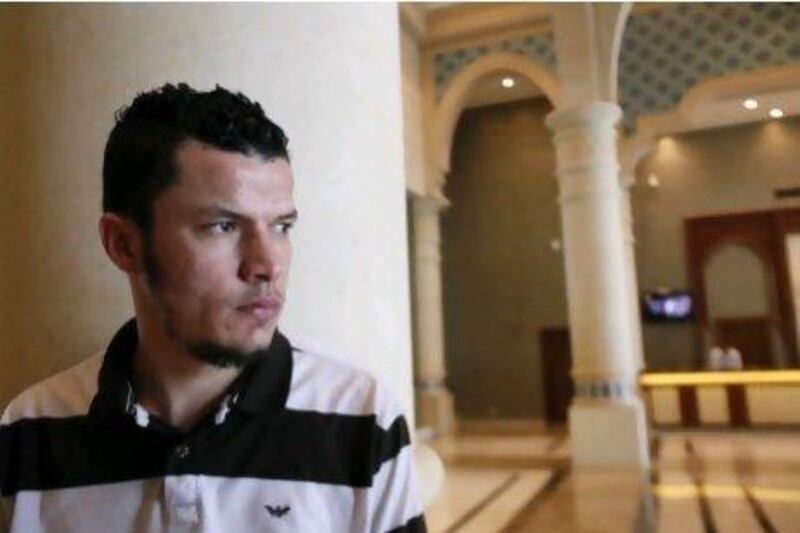AMMAN // Libya's government has told its citizens getting medical treatment in Jordan that today is the last day they can expect it to pay any bills associated with its chaotic war-wounded programme unless they have proper approval.
Furthermore, Libyans who have completed their treatment must leave Jordan immediately or start paying their hotel bills or apartment rentals themselves.
Libya, which settled half of its citizens' medical-related bills in Jordan this month, still owes Jordanian hospitals, doctors and hotels millions of dollars for treatment and services provided to about 54,000 Libyans who came to Jordan since August when Libyans started flying in for treatment at government expense.
In September, Libya made the programme official. It announced it was setting aside US$400 million (Dh1.4bn) to pay to send fighters wounded in the civil war and critically ill patients overseas for medical care because its medical system was in shambles.
Most patients went to Jordan because it does not require a visa from Libyans and it offers quality medical care. But the programme was grossly mismanaged and Jordan's hospital soon were packed with Libyans, some seeking plastic surgery, in vitro fertilisation and dental care as well as treatment for battle wounds.
Libya's interim government has struggled to get control over the programme and the number of Libyans streaming into Jordan has fallen substantially since January, when 20,000 Libyans came seeking care.
"The number of patients treated in private hospitals is much less," said Fawzi Hammouri, the president of Jordan's Private Hospital Association. "There was a time where the occupancy rate was 100 per cent."
Jordanian and Libyan officials say they signed agreements in March that assure that Libya will pay what it owes. The agreements require a thorough audit. That has started and will be the basis for a final settlement of debts.
"The Libyan government is committed to paying the rest of the bills after they are audited," Abdul Latif Wreikat, Jordan's health minister, said in a meeting with private hospital officials this month.
Libya established a health office in Jordan this month and cut the number of panels and committees that controlled parts of the programme to just three.
Until recently, there was no uniform criteria to determine who qualified for overseas treatment. Some of the people supervising the programme were approving overseas care for family and friends rather than patients most in need.
The new office in Jordan "will supervise all patients and injured in Jordanian hospitals and their referral in coordination with both health ministries," Ali Bin Jlayel, the director of the new Libyan office, told Al Rai newspaper in Jordan this month.
One of the new office's first steps was to impose the deadline that takes effect today. The office says it will pay for medical care and accommodations only for those who have proper approval. Also, the office will stop paying hotel and food bills for Libyans who have recovered from their treatment.
Jordanian hotels and rental apartments still are filled with Libyans participating in the programme.
Some are upset that the government plans to end the payments and complain that the chaos in the programme has caused them inconvenience.
Wounded Libyans, in particular, are annoyed.
"The hotel management told us last month that they will not serve us lunch anymore, but a few days later they apologised," said Haytham Kashkar, a 26-year-old Libyan who arrived in Jordan last October to be treated for shrapnel and bullet wounds he sustained in Sirte.
"I left the hotel. We have dignity and it is the fault of our government's mismanagement."
He said problems developed when the government seemed to be approving almost anyone seeking care for any ailment.
"The government should have given us the priority " he said.
Despite the new regulations, Mr Kashkar is sceptical that the programme will be run efficiently.
"Every three weeks, there is a problem, whether it is a delay in allowances for the injured or dispensing medical prescriptions."
Zakkariya Ibrahim, another wounded fighter, said there were some Libyans who used forged documents to get into the programme.
"Such people are giving us a bad name," said Mr Ibrahim, 26. "We are happy with the new regulations to evacuate the hotels once treatment is completed. We want to give our government a chance. We do not want to have our country's money squandered."
When Libya announced programme in September, it allocated US$400 million to treat fighters wounded in the war to overthrow Muammar Qaddafi. The most recent estimate puts the cost at $1.5 billion.
Incompetence and fraud account for much of the overspending. People with the right connections were able to travel to Jordan with several family members and stay at nice hotels with all expenses paid.
There were people getting cosmetic surgery and some Jordanian doctors were happy to provide all these services because they assumed Libya would pay.
The Libyan government has complained that doctors in Jordan and other countries abused the programme by providing care that clearly was outside the mandate of the programme and inflating the cost of treatment.
The onslaught of Libyan patients hit in January when about 20,000 arrived. They filled hotels, hospitals and airline seats. Jordanians couldn't get medical care because everyone was treating the Libyans.
"We are getting things organised after all the chaos," said Abdullah Al Zanbouzi, a member of a Libyan media committee for the injured. "Libya will only cover the expenses of the injured and has also narrowed the list of medical cases patients can be treated for."
[ foreign.desk@thenational.ae ]





